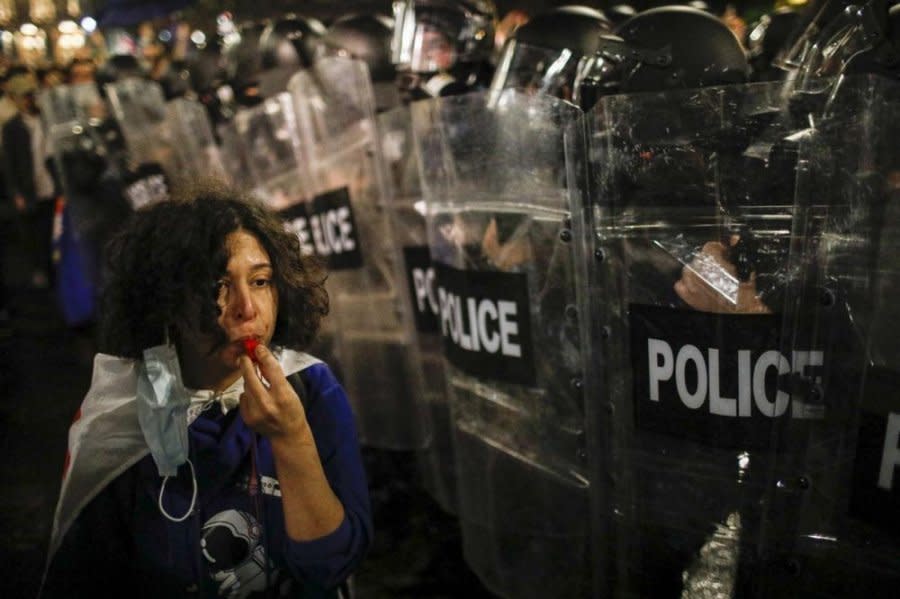Georgian authorities beat back protesters opposing 'foreign agent' law

- Oops!Something went wrong.Please try again later.
May 1 (UPI) -- Georgian authorities used tear gas and water cannons to beat back pro-European Union protesters, decrying a proposed "foreign agent" law similar to one used in Russia, in the capital Tbilisi on Tuesday night.
Demonstrators, some waving European Union flags, protested in front of the country's Parliament building before riot police tried to drive them away. Police beat and pushed protesters away when the tear gas and cannon proved ineffective.
Protesters, though, returned on several occasions, leading to escalated fights and eventually arrests by police. The actions occurred despite Georgia's President Salome Zourabichvili telling the interior minister for authorities to refrain from attacking peaceful protesters.
"Totally unwarranted, unprovoked and out of proportion use of force ongoing in Tbilisi against peaceful protesters," she wrote in English on X amid the violence. "Full responsibility falls entirely on the government. Right of peaceful protest is denied to the Georgian people."
In an address to the people, Zourabichvili called on the protesters to leave Parliament as "nothing happens there anymore," telling them to take their fight to the polls, with their country to hold parliamentary elections in October.
"Our fight goes to the elections and goes to repeal all the laws that have been passed by the government recently and that take us away from our European path," she said. "This is our goal."
"So, nothing will be solved at the door [of Parliament], except for the release of gas, some violence. We do not need to provoke because we will undoubtedly have to deal with violence in the future."
Zourabichvili did remark that the protest was proof that "Georgia will never be Russia."
Zourabichvili had voiced her opposition to the bill. The legislation requires non-governmental organizations, media outlets and others to register as foreign agents if they receive 20% or more of their funds from overseas.
Georgia's Parliament backed the bill in an initial vote despite the European Union criticizing it. A second vote is expected on Wednesday. Georgia had been granted EU candidate status in December, something that has been overwhelmingly popular among residents.
The bill, though, is favored by Georgian Prime Minister Irakli Kobakhidze, who blamed NGOs for sparking potential revolutions in the country on two different occasions, along with attacking the Georgian Orthodox Church.
In a speech to the public Wednesday following a second reading of the bill, he said the legislation was needed to "significantly bolster" the nation's sovereignty. He said it will also play "a crucial role in preventing the kind of violent actions by political minorities that we witnessed yesterday."
He said six police officers were hospitalized following the Tuesday night violence, including one who suffered a fractured eye socket and required surgery. Four protesters also suffered injuries, he said.
Russia's foreign agent law, which was approved in 2012, has been employed to silence opponents of Russian President Vladimir Putin and the Kremlin, including the news media, political figures and cultural leaders.
The United States on Wednesday condemned the law, describing it as "Kremlin-inspired" while reiterating the ruling party's stance that the legislation's intent is to silence critical voices and "destroy Georgia's vibrant civil society," State Department spokesman Matthew Miller said in a statement.
"This legislation and Georgian Dream's anti-Western rhetoric put Georgia on a precarious trajectory," he said.
"Comments mischaracterizing foreign assistance in Georgia -- which we have provided for 32 years to strengthen Georgia's economy, democracy, and ability to deter Russian aggression -- fundamentally undermine the strong relationship we have developed with the government and people of Georgia."

